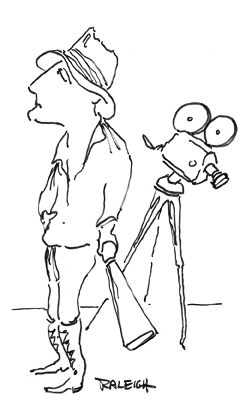Film: It’s Good to be a Mogul
By Henry P. Raleigh
ART TIMES November/ December 2011
 |
Maybe you saw it. Back in May TMC ran a seven part series, Movies and Moguls. Now on DVD, it’s a history of American movies from its infancy up to the end of the moguls and their film empires during the 1960’s. These one hour portions provide a neatly done survey of the sixty or so years of film, even to making amends for absences in previous film histories by including something of the role of women (other than stars) and African Americans. I imagine almost everyone at one time or another can think of a past era where they might have been more comfortable than the mess they‘re in right now. This is what makes nostalgia films so attractive after all. You may have absolutely no interest in turn-of-the-century St. Louis, perhaps had never known of such a place, yet after seeing “Meet Me in St. Louis” didn’t it seem a perfectly swell place and time to live in? “Hello Dolly” and “Oklahoma” can do it for you too.
For me, Movies and Moguls got me where I live, rather where I would like to live. I’ve even picked out the year of my birth —1900 give or take a year or two. You see, that would have brought me into the 1920’s at just the right age to make my spectacular entry into the movies. It’s not that I have an obsessive passion for those old silent films. Most I find are comparable to sitting through your child’s third grade enactment of the first Thanksgiving. No, I cherish this historic period for the excitement of invention, the wonder at the birth of a great art, the dawning of grand artistic opportunities. Well, frankly it’s because from a playwriting and technological point-of-view it looks pretty easy, an archaic developmental stage that might handily accommodate my talents. And it is a time not yet infected by algorithms. My research has shown that those first film people had never heard of algorithms, much less seen one.
My plan is to have been exposed to the most primitive efforts to produce movies by my 20th birthday. Probably as a toddler I had started out on nickelodeons quickly honing my understanding of film’s potential on Mack Sennett and Chaplin shorts. By 15 and seeing Theda Bara in “ A Fool There Was” I’d have recognized the important role of sex in film, enhancing my desire for film and a couple of other things. And long before anyone thought of it, though perfectly obvious to me, I’d have discovered parallel editing, which would be stolen by D.W Griffith who laughingly calls it the “switchback”. I was forgiving and allow him to butcher it up in his “Birth of a Nation” and “Broken Blossoms” when I was 19.
Polishing up my cinematic sophistication I began throwing in some foreign stuff — F.W. Murau’s “Nosferatu” and “Last Laugh”, Fritz Lang’s “Metropolis”. Bumping into Sergei Eisenstein I teach him about the benefits of accelerating story arcs and caesuras and whatnot and which promptly muddles in “Potemkin”. The only hitch in this scenario, and I am at the perfect draft age. Sometimes I am exempt from service because engaged in some secret government project but I can’t really come up with a credible explanation for this. Another option is to accompany the film director William Wellman, also 19, in his tour with the Lafayette Flying Corp. We both survive as heroes and he and I go on to produce “Wings” in 1927. However I don’t like flying — I tend to become nauseous. I mostly skip over this part.
Well, the upshot of all this is that by 25 I burst into the opening of the Golden Age of American film, fully conversant with everything anyone can know about film at this point in history and a lot more, too, dressed handsomely in a safari hat, breeches, and riding boots and brandishing a megaphone. I look remarkably like Cecil B. DeMille in his directing heyday but with a full head of hair. Clara Bow falls madly in love with me. As a matter of fact DeMille’s career is pretty much the direction I will take — director, producer, and eventually a power in Hollywood. You see, it is my intention that I shall be fully recognized just at the merger of Metro Pictures and Goldwyn Pictures forming the legendary Metro-Goldwyn Mayer Studio in the mid-twenties. It’s likely that Louis B. Mayer, a genuine mogul, has had his eye on me for some time and brings me in to replace Irving Thalberg, a year older than I am and a lesser genius, in charge of production.
This about sums it up, I guess. I’m in a position to climb the ladder of fame and become a mogul controlling a studio empire. About now my narrative gets rather fuzzy since I can foresee the film business is going to get more complicated with censorship, television, and communist investigations and I’m not sure I want the responsibility. Maybe I’ll simply retire to everyone’s despair and go on to invent algorithms. To be known as the Mogul of Algorithms sounds not at all bad.
